We’re independently supported by our readers and we may earn a commission when you buy through our links.

What are you looking for?
Search ideas for you, thesis nootropics review.
Sheridan Grant
Content Specialist
Sheridan is a writer from Hamilton, Ontario. She has a passion for writing about what she loves and learning new things along the way. Her topics of expertise include skincare and beauty, home decor, and DIYing.
Table of Contents
About Thesis Nootropics
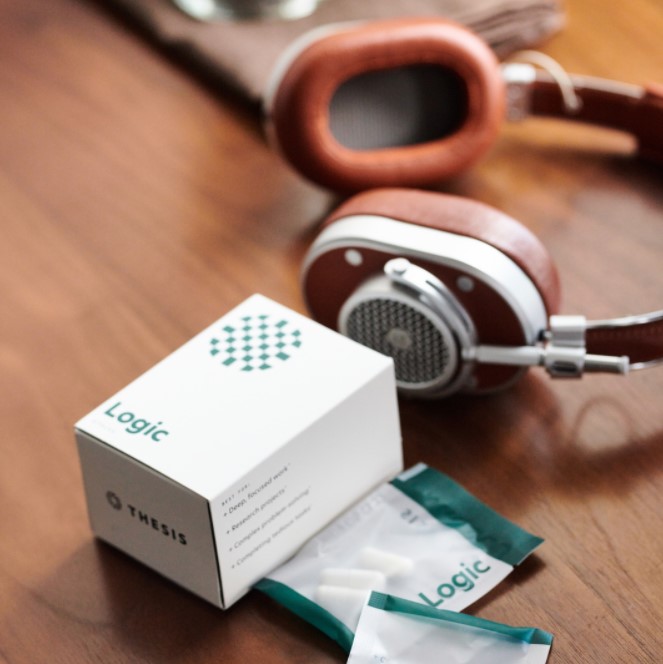
Hands up if you guzzle five coffees a day to stay awake, have tried all the supplements in the book desperate to improve your headspace, and aren’t interested in prescribed medications. Designed to increase focus , Thesis nootropics might be for you.
Thesis offers a customized blend of ingredients designed to optimize your cognitive function , with personalized details that tackle your specific needs. Nootropics boost brain performance in the same way a stimulant would, without the common negative effects.
A study published in the Journal of Alzheimer’s Disease found that nootropics may help improve cognitive function in people with Alzheimer’s disease.
Interested in finding out more about the brand and how it works? Leaf through our Thesis Nootropics review. We’ll be your guide through the company and the process, as well as details on the treatments, highlights from customer reviews, answers to important FAQs, and more, to help you decide if it’s worth the try.
Pros and Cons
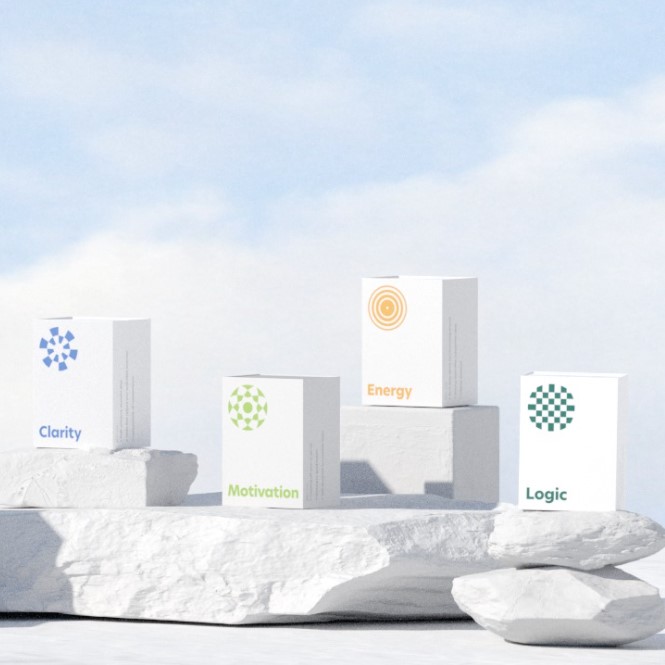
- Multiple cognitive benefits: Thesis Nootropics offers a variety of blends that cater to multiple aspects of cognitive function.
- Long-term effects: On top of short term benefits for daily life, Thesis nootropics ingredients are designed to impact the brain in the long-term.
- Personalized recommendations: Thesis Nootropics makes personalized recommendations based on your goals and unique brain chemistry.
- Potential side effects: The most common side effects to watch out for when you start taking Thesis Nootropics include heartburn, headaches, confusion, dizziness, loss of appetite, and digestive issues.
- Need to stop taking if issues arise: If you experience a headache or an upset stomach that won’t go away while taking their nootropics, Thesis recommends that you stop taking them.
What is Thesis Nootropics?
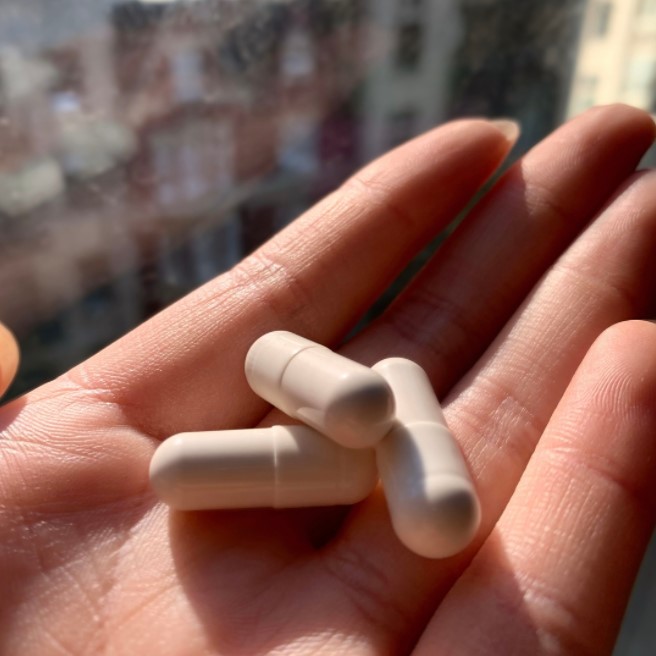
Nootropics are nutrient compounds and substances that are known to improve brain performance , such as caffeine and creatine. They help with issues that affect motivation, creativity, mood, memory, focus, and cognitive processing.
Nootropics are the ideal addition to an already healthy lifestyle that consists of exercise, proper nutrition, and enjoyable activities. Thesis nootropics are carefully formulated to target specific needs, ranging from energy to creativity. The brand focuses on safety, ensuring that all supplements adhere to FDA guidelines and go through multiple clinical trials.
How Thesis Nootropics Works

With all that being said, you may be wondering how Thesis provides users with an option that is specific to their needs. Fortunately, the process is simple and hassle free. Here’s how it works:
- Take the Thesis nootropics quiz
- Answer questions about your basic information
- Receive personalized recommendations
- Get your starter kit for $120 , or $79 monthly when you subscribe
After that, you’ll select one formula to take each week, taking one day off in between each different option. You’ll also track your results in the daily journal over the month to see how they affect your daily life.
From there, it operates as a subscription service. Users will be able to optimize their next shipment by telling the brand which formulas worked best.
If you don’t like any of the blends in your box, let the company know and they’ll switch it for something that’s a better fit for your lifestyle, genetics, and goals.
Thesis Nootropics Ingredients
Thesis Nootropics is a brand that offers personalized nootropics designed to enhance cognitive function and overall brain health. Their blends contain a variety of ingredients that are carefully chosen for their cognitive-boosting properties. Here are some of the key ingredients in Thesis Nootropics:
- Cognizin (Citicoline) : Cognizin is a type of choline that is known for its ability to enhance cognitive function, including memory and focus.
- L-Theanine : L-Theanine is an amino acid that is found in green tea, and is known for its ability to promote relaxation and reduce stress and anxiety.
- Lion’s Mane Mushroom : Lion’s Mane Mushroom is a type of medicinal mushroom that is believed to have cognitive-boosting properties, including improved memory and focus.
- Rhodiola Rosea : Rhodiola Rosea is an adaptogenic herb that is known for its ability to reduce stress and fatigue, and improve mental clarity and cognitive function.
- Ashwagandha : Ashwagandha is an adaptogenic herb that is known for its ability to reduce stress and anxiety, and improve memory and cognitive function.
- Phosphatidylserine : Phosphatidylserine is a type of phospholipid that is found in high concentrations in the brain, and is believed to support cognitive function, including memory and focus³
- Alpha-GPC : Alpha-GPC is a type of choline that is known for its ability to enhance cognitive function, including memory and focus.
- TAU (uridine): TAU is a blend of uridine, choline, and DHA, which is believed to support brain health and cognitive function.
- Artichoke extract : Artichoke extract is believed to enhance cognitive function by increasing levels of acetylcholine, a neurotransmitter that is important for memory and learning.
- Dynamine : Dynamine is a type of alkaloid that is believed to enhance cognitive function by increasing levels of dopamine, a neurotransmitter that is important for mood and motivation.
Overall, the ingredients in Thesis Nootropics are carefully chosen for their cognitive-boosting properties, and are designed to work together to enhance overall brain health and cognitive function.
Thesis Nootropics Health Benefits
Thesis Nootropics is a brand that offers personalized nootropics designed to enhance cognitive function and overall brain health. Their blends contain a variety of ingredients that are carefully chosen for their cognitive-boosting properties, and offer numerous health benefits. Here are some of the health benefits of Thesis Nootropics:
- Increased cognitive energy : One of the key benefits of Thesis Nootropics is increased cognitive energy, which can help improve productivity, mental alertness, and motivation, as it contains cognizin .
- Enhanced mental clarity : Another benefit of Thesis Nootropics is enhanced mental clarity,given from Lion’s Mane Mushroom which can help reduce brain fog and improve focus.
- Improved memory and learning abilities : Thesis Nootropics contains ingredients that are believed to improve memory and learning abilities, like Phosphatidylserine , which can help users retain information more effectively.
- Elevated mood : Thesis Nootropics may help elevate mood and reduce symptoms of anxiety and depression, thanks to ingredients like L-Theanine and Ashwagandha .
- Lowered stress levels : The adaptogenic herbs in Thesis Nootropics, such as Rhodiola Rosea and Ashwagandha , are known for their ability to lower stress levels and promote relaxation.
- Boosted focus : Thesis Nootropics contains ingredients like Alpha-GPC and Artichoke extract , which are believed to boost focus and concentration.
While Thesis Nootropics offers numerous health benefits, it’s important to note that the long-term effects of nootropics are not yet fully understood and more research is needed.
3 Thesis Nootropics Bestsellers
Thesis energy review.
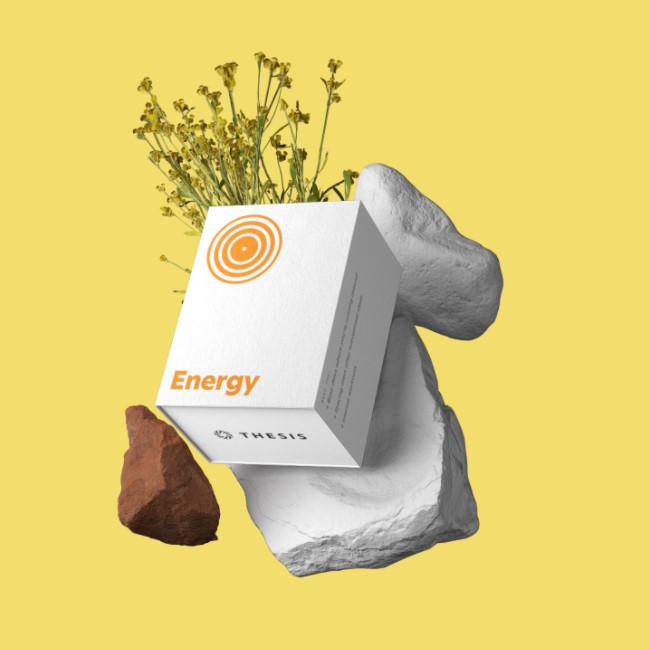
If you’re constantly struggling to keep up with the demands of your busy life, it might be time to try a natural energy booster like Thesis Energy. This powerful nootropic blend is specifically designed to increase energy, overcome fatigue, and build mental stamina.
Thesis Energy is caffeine-free, making it a great option for those who are sensitive to caffeine or looking for a natural alternative to traditional energy drinks. The Energy formulation is designed to help improve focus and mental clarity, increase cognitive energy, and reduce fatigue. Whether you’re facing a busy day at work, recovering after a night of poor sleep, or gearing up for an intense workout, Thesis Energy can help you power through.
Each ingredient in Thesis Energy is carefully chosen for its energy-boosting properties. The specific ingredients can vary depending on your needs, but they work together to help increase energy, improve mental clarity, and reduce fatigue.
To get the most out of Thesis Energy, take it every morning on an empty stomach. You can also take it again after lunch if you need an extra boost. It’s designed to help you tackle busy, hectic days, recover from poor sleep, and power through intense workouts.
If you’re tired of relying on coffee and energy drinks to get through the day, it might be time to give Thesis Energy a try. Check availability and start boosting your energy naturally today!
Thesis Creativity

If you’re someone who struggles with creativity or finds yourself feeling stuck in your creative endeavors, Thesis Creativity may be worth considering. This nootropic supplement is designed to help spark inspiration, enhance verbal fluency, and boost confidence in your own great ideas.
So what’s in Thesis Creativity? The ingredients may vary depending on your specific needs, but these ingredients work together to support stress management, memory function, mood regulation, and energy production.
By supporting stress management, memory function, and mood regulation, Thesis Creativity can help free up mental space for more creative thinking. Additionally, the caffeine and L-theanine combo can provide a boost of energy and focus without the jitters and crash that can come with caffeine alone.
To get the most out of Thesis Creativity, it is recommended to take it every morning on an empty stomach and again after lunch if you need an extra boost. This nootropic blend is particularly helpful for brainstorming and creative thinking, writing and creative projects, and public speaking and social situations.
As with any nootropic supplement, it’s important to note that the long-term effects of Thesis Creativity are not yet fully understood and more research is needed. It’s always a good idea to speak with a healthcare professional before adding any new supplements to your routine.
In summary, if you’re looking for a little extra help in the creativity department, Thesis Creativity may be a valuable addition to your nootropic lineup. Its unique blend of ingredients can help support mental clarity, mood regulation, and energy production, making it a valuable tool for any creative individual.
Thesis Logic
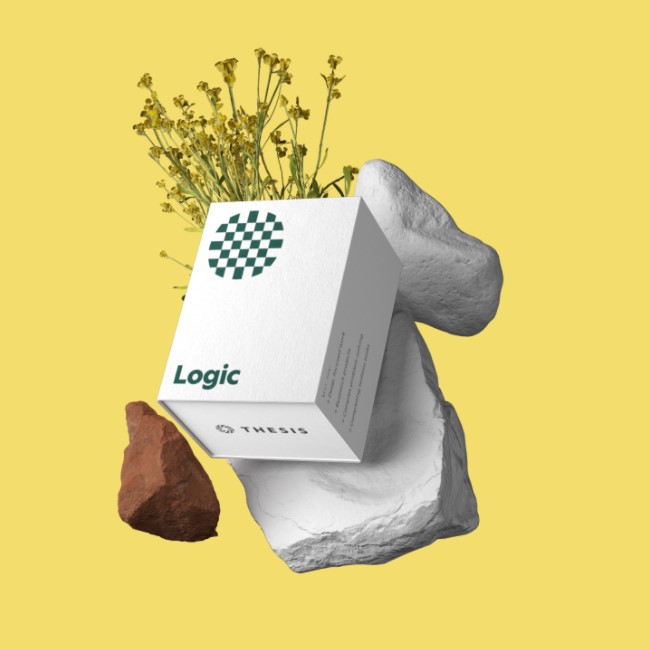
If you’ve been having trouble with your memory lately, such as forgetting what you had for lunch yesterday or struggling to recall common words, then Thesis Logic may be just what you need. This formula is designed to help enhance your processing speed, boost your memory, and deepen your thinking.
Thesis Logic is caffeine-free, making it a great option for those who are sensitive to caffeine. The formula is ideal for use during deep, focused work, complex problem-solving, research projects, and completing tedious tasks.
Taking Thesis Logic is easy – simply take it every morning on an empty stomach, and take it again after lunch if you need an extra boost. By incorporating Thesis Logic into your daily routine, you may notice improvements in your cognitive function and overall mental performance.
Who Is Thesis Nootropics For?
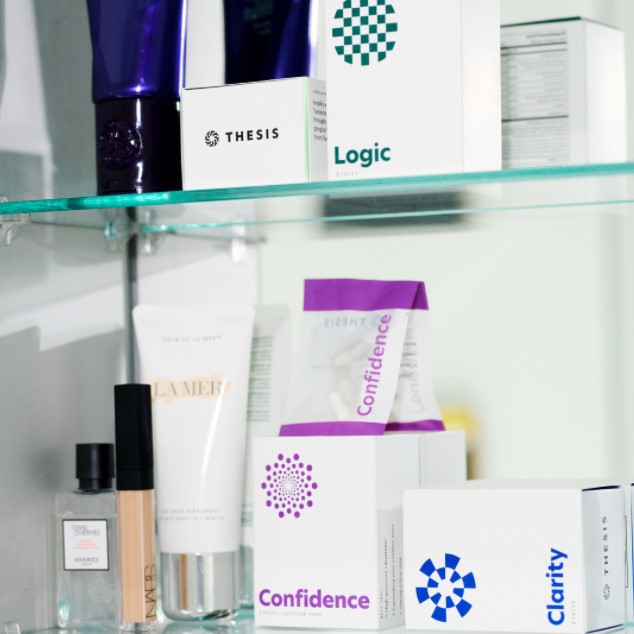
Thesis nootropics are designed for a number of different specific needs, including anyone who wants to focus better, have more energy, and maintain mental clarity. All in all, the products are specifically formulated to improve day to day life and target your specific needs .
Thesis Nootropics Side Effects

While Thesis nootropics are designed to enhance cognitive performance and provide a range of benefits, it’s important to be aware of the potential side effects that can occur. As with any supplement, individual reactions can vary, and some people may experience side effects while others may not.
Some of the potential side effects of Thesis nootropics include:
- Insomnia : Some nootropics contain caffeine or other stimulants that can disrupt sleep patterns and lead to difficulty falling asleep or staying asleep.
- Blurry vision : Certain nootropics, such as those containing alpha GPC, have been linked to temporary blurry vision.
- High blood pressure : Stimulant-based nootropics can increase blood pressure, which can be dangerous for people with hypertension or other heart conditions.
- Fast heart rate : Similarly, stimulants can also increase heart rate, leading to palpitations or a rapid pulse.
- Circulation problem s: Certain nootropics, such as vinpocetine, can affect blood flow and circulation, leading to issues like dizziness, nausea, or headaches.
- Addiction : Some nootropics, such as those containing racetams, have been associated with the potential for addiction or dependence if used long-term.
It’s important to remember that not all nootropics will produce these side effects, and the severity of any reactions will depend on individual factors such as dosage, duration of use, and underlying health conditions. However, it’s always wise to discuss any potential risks with a healthcare professional before starting any new supplement regimen.
Additionally, it’s important to follow dosage instructions carefully and not to exceed recommended amounts, as this can increase the risk of side effects. By being mindful of potential risks and using nootropics responsibly, users can reap the benefits of these supplements without experiencing adverse effects.
Thesis Nootropics Reviews: What Do Customers Think?
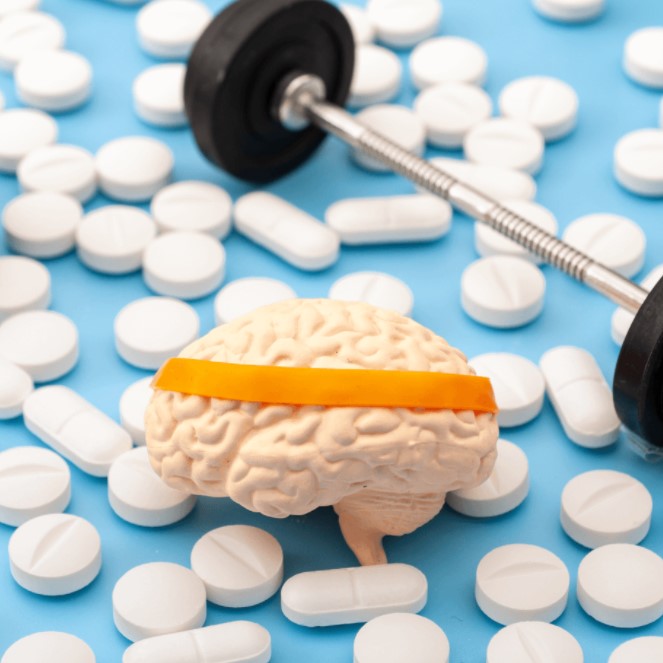
At this point in our Thesis nootropics review, it’s time to turn to what customers are saying. So, we sourced testimonials from the brand’s website, Reddit, and ZenMasterWellness. And spoiler alert, the Thesis nootropics reviews we came across have nothing but good things to say.
On takethesis.com , the brand earns 4.4/5 stars out of 7,956 reviews. One patron describes their particular blend as the perfect alternative to prescription meds :
“ I have been off stimulants for months now and these formulas are far superior. My husband and daughter both noticed the change and said I have been more productive, focused, less anxious, and more “thinking outside the box”. I have tried for years to get off stims and nothing would work .”
On Reddit, many reviewers share similar sentiments about how effective the products are. One buyer shares that they tried tons of different nootropics on the market, and Thesis stands out amongst the crowd .
On ZenMasterWellness, one reviewer states that their blend provided the exact results they were looking for :
“ They offer notable improvements to how well I’m able to focus, stay on task, and grind when it’s time to grind. In practice, this usually looks like a clearer mind and an improved ability to just… chill. With the Clarity and Creativity blends, in particular, I just feel leveled out .”
Backed by clinical trials and real customer experiences, Thesis stands out in the world of nootropics and supplements. The personalized selections prove effective, while the quality ingredients live up to expectations.
Is Thesis Nootropics Legit?
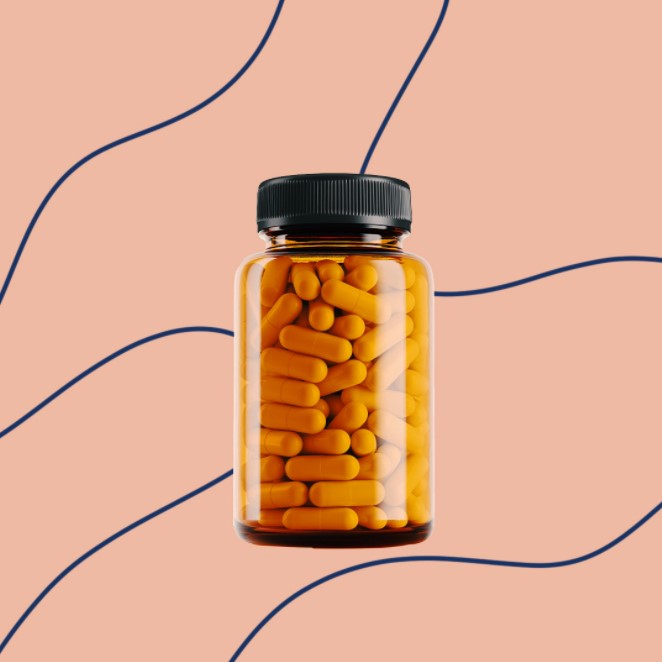
If you’re wondering if this brand offers products that are too good to be true, this Thesis nootropics review is here to say that it is the real deal .
The brand is backed by numerous clinical trials, which highlight how 86% of customers reported improvements in a wide range of cognitive challenges, while 89% noticed an improvement in their ability to reduce stress and maintain energy.
Is Thesis Nootropics Worth It?
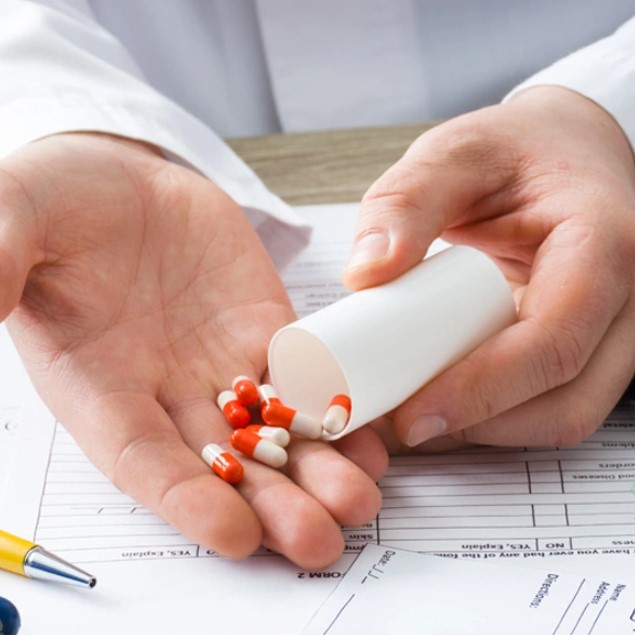
Thesis is an appealing choice in the world of nootropics because it provides a completely customized selection based on your needs and goals. Plus, the ingredients are potent and ensure the best effects—and you only end up paying for the benefits you actually need.
With that in mind, this Thesis nootropics review deems the brand worth the try.
Alternatives
Here are some alternatives to Thesis Nootropics that you might find interesting:
- Mind Lab Pro – This nootropic supplement is designed to improve cognitive function and mental performance. It contains 11 ingredients that work together to enhance memory, focus, and overall brain health.
- Thorne Supplements : If you’re looking for high-quality, science-based supplements, Thorne is a great choice. Their products are designed with the latest research in mind and are rigorously tested for quality and purity. Some of their popular offerings include multivitamins, protein powders, and omega-3 supplements.
- WeAreFeel Supplements : WeAreFeel is a supplement brand that offers a variety of products designed to support different aspects of your health. Their supplements are vegan-friendly and free from artificial colors, flavors, and preservatives. Some of their popular offerings include multivitamins, probiotics, and omega-3 supplements.
- Neuro Gum : If you’re looking for a quick and easy way to boost your focus and energy levels, Neuro Gum is a great option. This gum is infused with caffeine and other natural ingredients that can help improve mental clarity and alertness. Plus, it’s sugar-free and comes in a variety of delicious flavors.
- Neuriva Plus : Neuriva Plus is a brain supplement that’s designed to improve memory, focus, and cognitive performance. It contains a blend of natural ingredients, including coffee fruit extract and phosphatidylserine, that have been shown to support brain health. If you’re looking for a natural way to boost your cognitive function, Neuriva Plus is worth considering.
Thesis Nootropics Promotions & Discounts
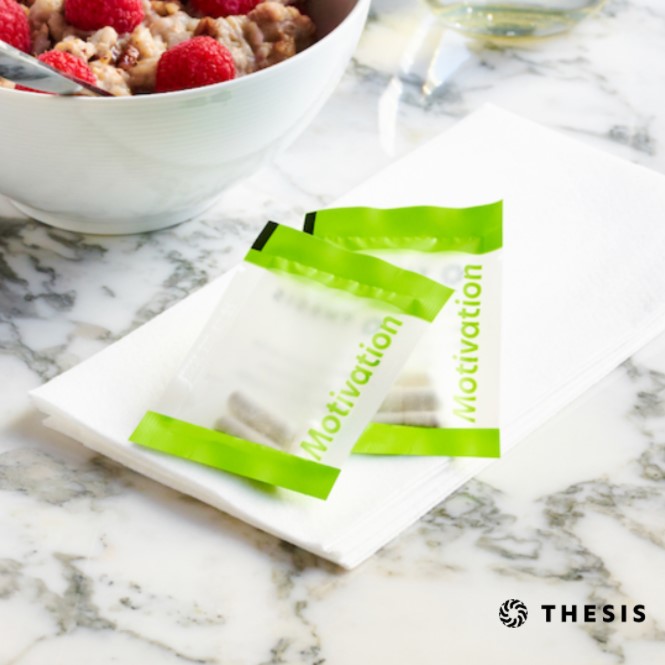
There aren’t currently any Thesis promos or discounts available. That being said, if you subscribe for recurring shipments of your recommended products, you’ll save $40 monthly .
Where to Buy Thesis Nootropics
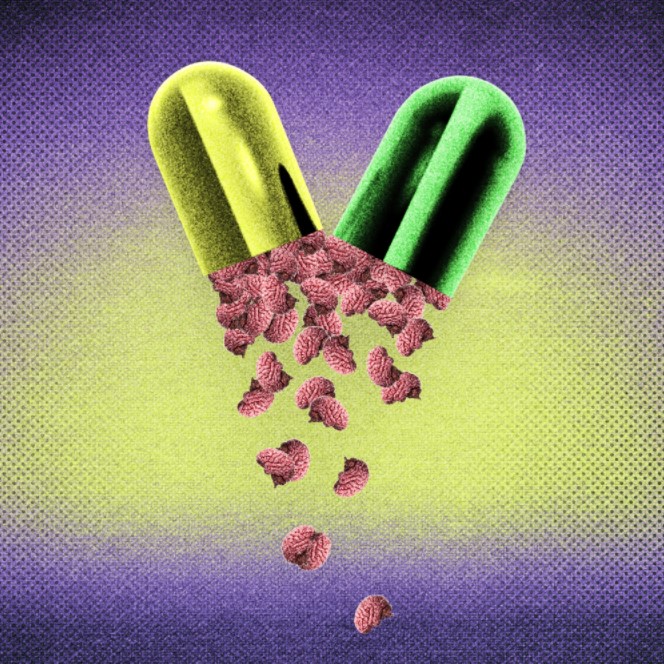
At the time of this Thesis nootropics review, the products are exclusively available on the brand’s website, takethesis.com .
Is Thesis Nootropics vegan?
Thesis nootropics are made with only vegan ingredients . That being said, while the brand has taken precautions to protect against cross contamination, the products are not certified vegan.
Is Thesis Nootropics gluten-free?
On top of being vegan, Thesis products are made without gluten, eggs, or nuts . Again, while the brand strives to protect users against cross contamination, the products are not certified gluten free.
What is Thesis Nootropics’ Shipping Policy?
If you’re anxiously awaiting your order from this Thesis nootropics review, you’ll be happy to hear that the company offers speedy shipping, sending orders out within 1 business day. After that, packages should arrive within only 1-3 business days . Costs are calculated at checkout.
At this time, Thesis is not able to offer international shipping. This Thesis nootropics review recommends following the brand on social media and signing up for the newsletter to stay up to date with shipping policies.
What is Thesis Nootropics’ Return Policy?
If you find that your Thesis formula isn’t working out, the company requests that you contact them to make changes and adjustments to ensure you are able to receive the proper help.
If you would still like to make a return, follow these simple steps for a refund:
- Submit your refund request
- Ship the items back within 30 days of the original delivery
- Send an email with your tracking number to the brand
- Return any remaining product in their original packaging to:
Thesis Returns 902 Broadway
6th Floor New York, NY
Once your return has been received, a refund will be processed and email confirmation will be sent. It’s also important to note that the brand can only refund one month’s supply per customer and return shipping is the customer’s responsibility.
How to Contact Thesis Nootropics
We hope you enjoyed this Thesis nootropics review! If you have any further questions about the brand or its products, you can contact them using the following methods:
- Call 1 (646) 647-3599
- Email [email protected]
902 Broadway Floor 6 New York, NY 10010
If you’re looking for other ways to boost your productivity via supplements, check out these other brands we’ve reviewed:
Thorne Supplements Review
WeAreFeel Supplements Review
Neuro Gum Review
Neuriva Plus Review
Our team is dedicated to finding and telling you more about the web’s best products. If you purchase through our links, we may receive a commission. Our editorial team is independent.
Ask the community or leave a comment
Customer reviews, leave a review, ask the community or leave a comment cancel reply.
Your email address will not be published. Required fields are marked *
This field is required
This field is required Please use a valid email
Save my name, email, and website in this browser for the next time I comment.
You may also be interested in

Alo Yoga Review


Briggs and Riley Review
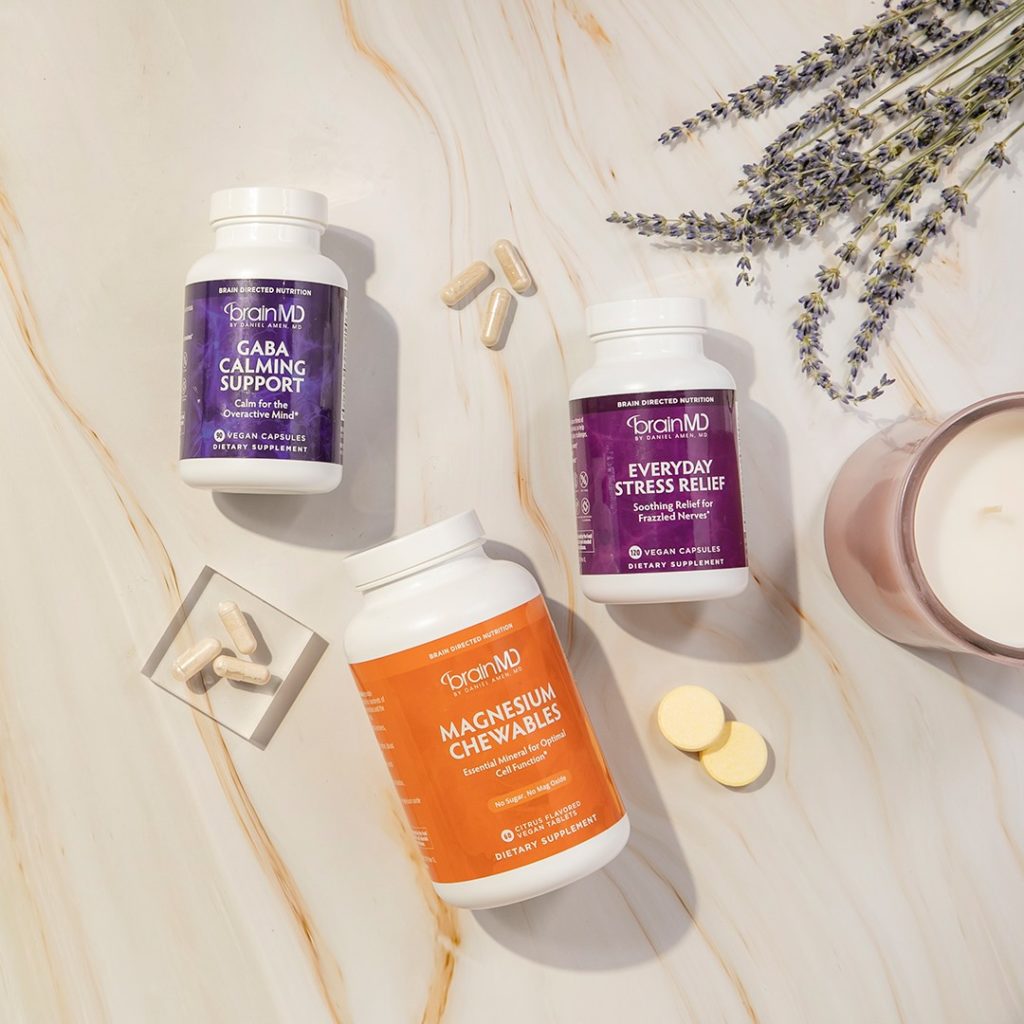
BrainMD Supplements Review

PartyLite Review
- Build Your Own Box
- Ingredients
blends tailored to your unique needs.
- Shop Blends
- Refer a Friend, Get $25
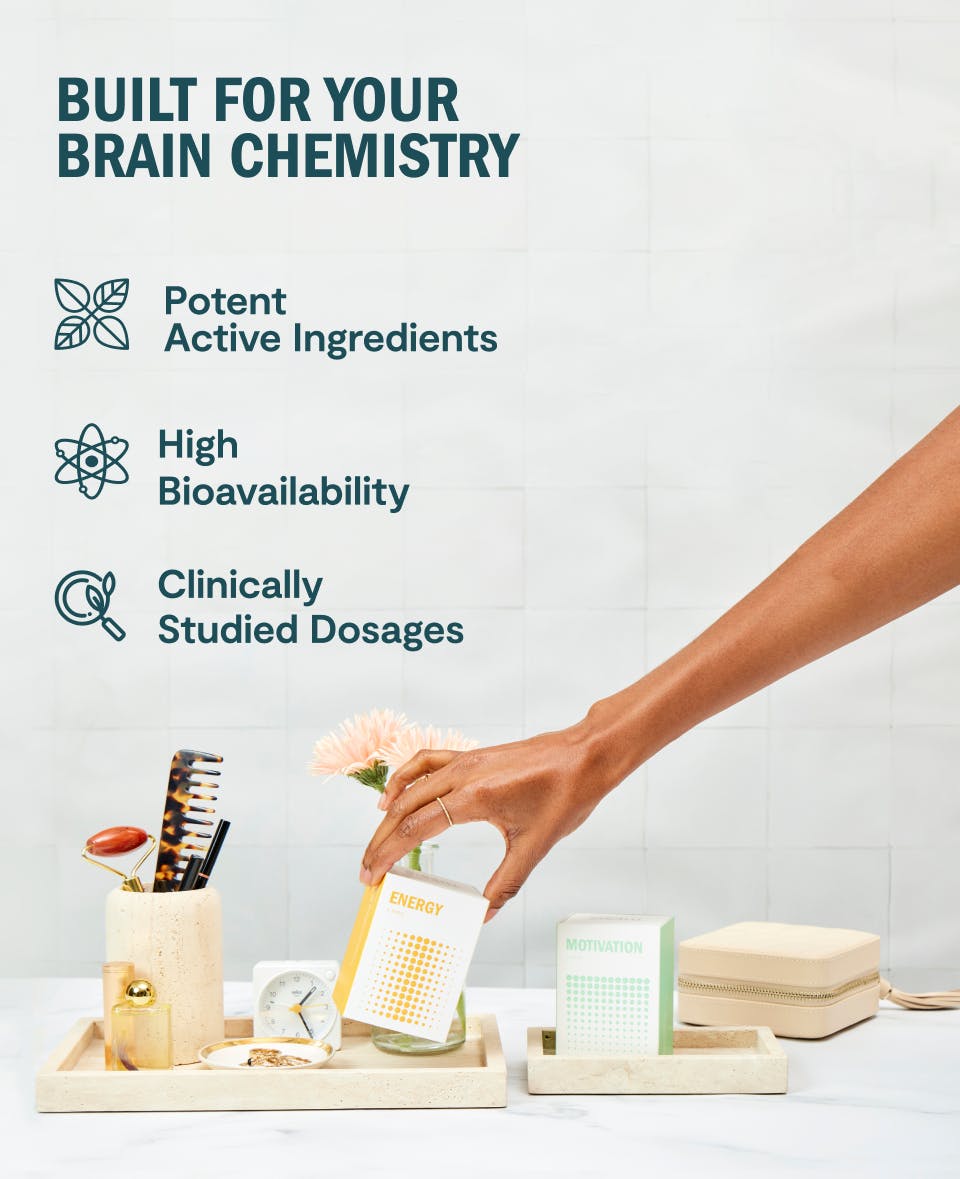
4 tenets we believe in
From seed to shelf, our science, product development, and supply chain teams work carefully to uphold these key tenets, every step of the way.
Sourced with certainty
We work exclusively with suppliers we trust to source the highest quality ingredients.
Tested for purity
FDA cGMP compliant at all stages of production. Our ingredients & blends are third party lab tested, the gold standard for safety.
Backed by science
All our formulas are backed by the latest research to ensure they meet your body’s needs efficiently—more benefit, fewer pills.
Packaged for perfection
We package our products in a clean-room environment using pharmaceutical-grade equipment—all in accordance with guidelines.
Recommendations made
Ingredients tested
Winning formulas in the first month
Customer satisfaction
1-1 coaching to maximize your results
Your coach will guide you on how to find the most optimal blend that will be the most effective for you.
Ian Greenawalt
Neuroscience, Behavioral Neuropharmacology
Ian is passionate about providing people with an understanding of the brain- utilizing his expertise in dopamine signaling, attentional disorders, and memory to empower others to lead healthier, more fulfilling lives.
Ian’s blends
Erinn Young
Integrative Nutrition Coach
Erinn believes in taking a holistic approach to treatments while focusing on root causes. She has a background in personal training, kickboxing, and enjoys learning about the connection between the brain and body.
Erinn’s blends
Kevin Tucker
Certified Meditation Coach
Kevin believes in maximizing human potential through balanced nutrition, therapeutic body movement, and hormone regulation. He leverages his experience with breathwork, herbal medicine, and mindfulness to manage stress.
KEVIN’s blends
Michelle Mathew
Naturopathy, Biology
Michelle takes an integrative medicine approach to understand the root cause of symptoms, combining acupuncture principles and herbal medicine knowledge to achieve overall wellness and optimize male/female fertility.
Michelle’s blends
Amanda Chaplin
Health Sciences, Naturopathy
Amanda believes in utilizing root cause medicine to optimize health. She is passionate about neurodegenerative disease, attention deficit disorders, and aspires to build a medical practice that focuses on endocrinology.
Amanda’s blends
Chris Espinosa
Certified Nutrition Coach
Chris is passionate about helping others achieve mental and physical health through balanced lifestyle practices. He has extensive experience as a strength and conditioning coach, training collegiate and professional athletes to perform at their best.
Chris’s blends
Jocelyn Lara
Certified Fitness Coach, Kinesiology
With a focus in understanding the human body and its movement patterns, Jocelyn excels in designing tailored programs that optimize performance to help clients achieve their desired results.
Jocelyn's blends
Trusted by experts
Dr. gabrielle lyon.
Functional Medicine & Nutritional Sciences
“I work with CEOs, celebrities, and other top performers in my practice. Thesis is what I recommend and take personally for focus and cognition. I even used it to help me nail my first TedX talk.”
Gabrielle’s blends
Professional Basketball Player & Mental Health Advocate
“With a busy life on and off the court, Thesis gives me energy and focus to get through the longest days and keep me sharp.”
Kevin's blends
Ultra-endurance Athlete & Nutrition Advocate
"Thesis has provided a substantial benefit to my ability to focus. Creativity works best for me — I take it 30 mins before a podcast or writing and it helps get me into the zone."
RICH’s blends
Find blends tailored to your unique needs.
A note from our founder.
“As long as I can remember, people thought I was stupid, lazy, or unmotivated. I started to believe it. In school, I would read the same page over and over again, without absorbing anything. At 16, I dropped out of high school and went to work at a sandwich shop.
Fast-forward ten years — I scored in the 99th percentile on the GMAT and earned Master’s degrees from Yale and INSEAD. Nootropics turned everything around for me, and helped me form the positive habits that I built my success on. Once I balanced my brain chemistry, I could perform like never before.
I take Energy to get me going in the morning and Motivation to power through long afternoons.”
Dan’s blends
We’re changing minds
Promoting mental health and wellness for everyone is our main priority. That’s why we work with Covenant House, a shelter for runaway and homeless youth. Dan, our Founder, was one of them.
Lazy doesn’t exist.
We learned firsthand that it’s possible to change your brain, and doing so can have an enormous impact on your life. To anyone struggling with focus, memory, attention, what have you, we’ve been there. It’s a neurotransmitter imbalance, and you can do something about it.
A message from our founder
Take control of your mind.
Founder & CEO
As long as I can remember, people thought I was either stupid, lazy, or unmotivated. I started to believe it. In school, I remember reading the same page over and over again, without absorbing anything. At 16, I dropped out of high school and went to work at a sandwich shop.
Fast-forward ten years — I scored in the 99th percentile on the GMAT and earned Master’s degrees from Yale and INSEAD. Nootropics turned everything around for me, and helped me form the positive habits that I built my success on. Once I balanced my brain chemistry, I could perform like never before.
I take Energy to get me going in the morning and Motivation to power through long afternoons.
Promoting mental health and wellness for everyone is our main priority. That’s why we work with Covenant House, a shelter for runaway and homeless youth. Too often, untreated mental health issues cause kids to fail in school and end up in shelters. Dan, our Founder, was one of them. This is just one piece of our commitment to making sure everyone has the opportunity to reach their full potential
Stop procrastinating
- The Magazine
- Stay Curious
- The Sciences
- Environment
- Planet Earth
The Science Behind Nootropics – Do They Actually Work?
Herbal brain boosters are on the rise, but does science back them up here's some truth behind nootropics and their alleged benefits..

Sometime in 2024, I started getting ads in my Instagram feed from a supplement company called Thesis. The ads generally featured good-looking, fashionable people telling neat, 30-second stories about how the supplements had solved their chronic procrastination, indecision, or distractibility. Many of the evangelists were identified as high-achievers in their respective fields — a Ph.D. neuroscientist, a CEO, or a surgeon.
I’d be lying if I said that the ads weren’t compelling. As a digital journalist, my working life is constantly mediated by my computer screen. That same screen is a gateway to a functionally infinite amount of information, news, and entertainment. And, over the years, the internet has slowly harnessed more and more of my waking hours on and off the clock. It’s a reality that, at times, leaves me feeling overstimulated and paralyzed.
Many other people have had a similar experience. Over the past decade, young people have experienced an increasing amount of psychological distress , and people have been diagnosed with ADHD at higher and higher rates .
Nootropic supplement companies pitch an attractive solution. What if you could take a pill (or powder or gummy candy) that would make your brain function better in our technology-mediated world? Something that would help you focus on what is important, remember the right details and block out the noise. The nootropic industry is already worth more than $2 billion and is expected to double in size in the next decade, according to one report .
But, unlike prescription nootropics like Adderall or Ritalin, the U.S. Food and Drug Administration doesn’t highly regulate nootropic supplements. In many cases, American consumers must rely on the companies they buy from for information.
Testing and Research on Nootropics
Most of the ingredients found in nootropics have been studied to some extent. Thesis, the company that popped up in my Instagram feed, includes caffeine and L-theanine in most of their products. Research has reported that these two compounds might quicken your reaction time and boost your ability to process visual information and remember numbers .
Another common nootropic ingredient, Ashwagandha root, was shown to improve cognitive flexibility, visual memory, and reaction time in a study on 43 healthy Americans.
Other nootropic components, though, have far less evidence to back up their efficacy. Alpha-GPC, a common nootropic ingredient, was shown to mitigate drug-induced amnesia in rats in a study from the 1990s. Yet, subsequent studies on the cognitive effects of the chemical on healthy people have yielded little to no positive results .
The evidence for the efficacy of most nootropic ingredients lies in a gray area somewhere between hearsay and the robust clinical trials used to approve pharmaceuticals. There’s almost always a reason to be hopeful. Yet, there’s almost never enough evidence to characterize the effects completely or with conviction.
Read More: Does Neuriva Work and Can It Really Help the Brain?
The Nootropic Company Thesis
By his own admission, Thesis founder Dan Freed always struggled with focus.
“I remember how painful it was. It’s seared into my memory,” Freed says.
Sitting in a classroom was so painful, that Freed dropped out of high school and embarked on a career in the service industry. According to Freed, he eventually worked his way up to a position as a station chef at a 3-star Michelin restaurant. But, after a decade in the industry, he was burnt out and decided to study business management. His attention problem hadn’t improved much over the years, and he was desperate to fix it.
According to Freed, this is when he started experimenting with Nootropics. He read everything he could find on the subject and developed his own proprietary blend of powders, mushrooms, and pills. He credits the supplements with earning him a high score on the GMAT and a spot in a master’s program with the Yale School of Management.
Thesis’ business model is built around Freed’s early experiments with nootropics. The company encourages users to test a number of its six proprietary blends before settling on the one that works best for them.
“We created this data-driven approach to essentially finding the right ingredients for each individual to unlock their potential,” Freed says.
Read More: Strange Side Effects From Supplements and What You Need to Know
A Quasi-Scientific Approach
According to Freed, each ingredient in Thesis products goes through an internal review process that takes months to complete.
First, the company does a literature review of peer-reviewed research on the compound. Second, Freed tries it himself (this step hasn’t changed since the early days of powders and pills). Third, willing employees, friends and family members give it a shot. Finally, Thesis conducts “beta testing,” a randomized test on around 50 to 200 people, which Freed says is designed to mimic a crossover design that might be conducted on a prospective pharmaceutical.
These four steps roughly mirror the first two phases of the clinical trials of pharmaceuticals seeking FDA approval . Of course, there are third and fourth phases to a full clinical trial. Thesis stops after two. The company is allowed to do this because, technically, it is selling dietary supplements, not drugs. You can find a statement like this at the bottom of practically any nootropic company selling to Americans:
“The products and information on this website are not intended to diagnose, treat, cure or prevent any disease. The information on this site is for educational purposes only and should not be considered medical advice…”
The FDA issues a few warning letters a year to nootropics companies that use overly prescriptive language or forget to include a disclaimer. Thesis has not received one.
Freed argues that the lower bar for supplements like the ones that Thesis sells is actually advantageous for consumers. The nootropics industry can find ingredients faster and with far less investment than the pharmaceutical industry.
“The question I get asked the most is essentially, ‘do nootropics work?’” Freed says. “The question I think most people should be asking is, ‘which nootropics work for me?’”
Freed has so much conviction in his products, that he says he is working to find researchers to take Thesis blends through full clinical trials. But, until that day, customers will have to decide for themselves if the evidence is enough to go on.
Even after reporting this story, I’m unsure how I feel about nootropics. On the one hand, none of the ingredients seem to be harmful (except to your wallet), and the idea of taking a pill to make my brain work better is still tantalizing. On the other hand, simple things like sleeping and eating well have even more evidence to back up their efficacy on cognitive health. For now, I think I’ll set up a Google Scholar Alert and keep following the news.
Read More: Memory-Boosting Supplements Could Lack Compounds and Contain Bacteria
Article Sources
Our writers at Discovermagazine.com use peer-reviewed studies and high-quality sources for our articles, and our editors review for scientific accuracy and editorial standards. Review the sources used below for this article:
Psychological Medicine . Trends in self-reported psychological distress among college and university students from 2010 to 2018
Missouri medicine. ADHD Diagnostic Trends: Increased Recognition or Overdiagnosis?
Allied Market Research. Nootropics Supplement Market Size, Share, Competitive Landscape and Trend Analysis Report, by Type, by Product Type, by Distribution Channel : Global Opportunity Analysis and Industry Forecast, 2023-2032
Biological Psychology. The effects of l-theanine, caffeine and their combination on cognition and mood
Journal of Ayurveda and Integrative Medicine . Efficacy of Withania somnifera supplementation on adult’s cognition and mood
Pharmacology Biochemistry and Behavior . Effect of a new cognition enhancer, alpha-glycerylphosphorylcholine, on scopolamine-induced amnesia and brain acetylcholine
Journal of the International Society of Sports Nutrition . The effects of alpha-glycerylphosphorylcholine, caffeine or placebo on markers of mood, cognitive function, power, speed, and agility
FDA.gov. Step 3: Clinical Research
FDA.gov. Warning Letter
Gabe Allen is a Colorado-based freelance journalist focused on science and the environment. He is a 2023 reporting fellow with the Pulitzer Center and a current master's student at the University of Colorado Center for Environmental Journalism. His byline has appeared in Discover Magazine, Astronomy Magazine, Planet Forward, The Colorado Sun, Wyofile and the Jackson Hole News&Guide.
- drugs & addiction
- medical technology
Already a subscriber?
Register or Log In

Keep reading for as low as $1.99!
Sign up for our weekly science updates.
Save up to 40% off the cover price when you subscribe to Discover magazine.

IMAGES
VIDEO
COMMENTS
Try Energy. We formulate potent nutrient compounds to enhance mental performance and make personalized recommendations based on your goals and unique brain chemistry. Tell us about yourself and your goals. We’ll use your answers to determine your baseline and build your recommendations.
We developed six unique nootropic blends designed to cater to different cognitive goals. Our quiz assesses various traits to pinpoint areas with the greatest potential for improvement (e.g., focus, energy, motivation, etc.).
Thesis Nootropics is a brand that offers personalized nootropics designed to enhance cognitive function and overall brain health. Their blends contain a variety of ingredients that are carefully chosen for their cognitive-boosting properties, and offer numerous health benefits.
I tested four Thesis Nootropics’ customized blends for one week. Read about my experience in this review and find out if the nootropics are worth the cost.
FDA cGMP compliant at all stages of production. Our ingredients & blends are third party lab tested, the gold standard for safety.
The FDA issues a few warning letters a year to nootropics companies that use overly prescriptive language or forget to include a disclaimer. Thesis has not received one. Freed argues that the lower bar for supplements like the ones that Thesis sells is actually advantageous for consumers.